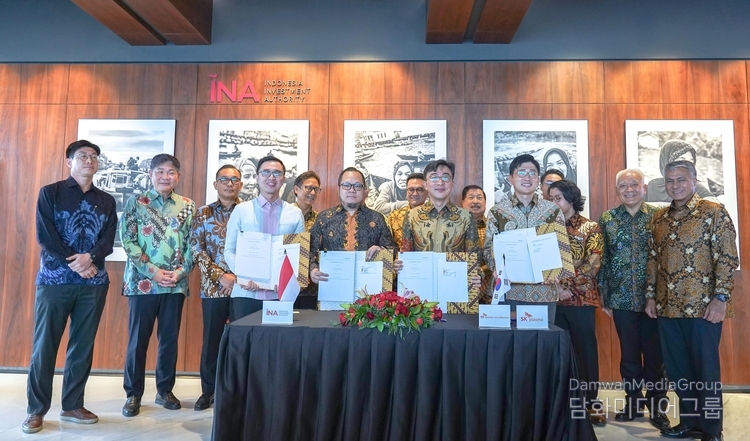By Diplomacy Journal Lee Kap-soo
SK Plasma, led by CEO Kim Seung-joo, announced on Nov. 14 that it has signed investment agreements with the Indonesia Investment Authority (INA) for the operation of its Indonesian joint venture, PT SKPLASMA CORE INDONESIA (SK Plasma Core).
In October last year, SK Plasma signed a term sheet about direction of project and transaction with INA to establish a plasma fractionation plant in Indonesia.

The signing ceremony of investment agreements was attended by Ahn Jaehyun, CEO of SK Chemicals and SK Plasma, Kim Seung-joo, President of SK Plasma, Roh Hyunho, CEO of PT. SKPlasma Core Indonesia, and Ridha Wirakusumah, CEO of Indonesia Investment Authority, Budi Gunadi Sadikin, Minister of Health of the Republic of Indonesia, Todotua Pasaribu, Vice Minister of Investment and Downstream Industry (BKPM) of the Republic of Indonesia, and officials from the Central Committee of the Indonesian Red Cross Society (PMI), and the Korean Embassy in Indonesia attended the event.
Following the signing of the investment agreements, INA will secure a significant minority shareholding, becoming the second-largest shareholder of PT. SKPlasma Core Indonesia.
This contract is the first case of a Korean company attracting investment from INA. It is evaluated that SK Plasma's excellent operational experience in PDMP factories and superior technology have been recognized, reflecting the Indonesian government's active interest and commitment to self-sufficiency in PDMPs.
SK Plasma secured the right to operate the PDMP business from the Indonesian Ministry of Health and established a joint venture, SK Plasma Core Indonesia, to build a plasma fractionation plant.
The new plant, which is scheduled to be operated in the fourth quarter of 2026, will be located in Karawang International Industrial City with a land area of approximately 49,000m2 and will produce PDMPs such as albumin and immunoglobulin by fractionating up to 600,000 liters of plasma per year.
The completion of the local fractionation plant will ensure a stable supply of medicines such as albumin, which is essential for emergency patients and surgeries, and realize self-sufficiency in plasma fractionation products, which were previously 100% imported.
Along with the construction of the local plant, SK Plasma plans to promote a contract manufacturing organization (CMO) to ensure a stable supply of PDMP even during the construction period.
To this end, Indonesia will supply plasma from its citizens to SK Plasma and finished PDMP such as albumin produced at the Andong plant will be sent back to Indonesia as raw materials. During this period, SK Plasma will also provide preliminary training to local Indonesian workers to help stabilize production as soon as possible.
“Health is the right of every citizen, and the construction of a local plant in Indonesia will allow us to reduce our dependence on importing essential medicines,” said Ridha Wirakusumah, CEO of INA. “We look forward to strengthening Indonesia's healthcare capacity through the transfer of PDMP technology and knowledge sharing.”
“The signing of the investment agreement with INA is an achievement of Korea and Indonesia's continued cooperation in the healthcare sector,” said Seungjoo Kim, President of SK Plasma. “Through our PDMP manufacturing capabilities, we will work closely with countries that need to localize essential drugs to contribute to improving healthcare infrastructure around the world.”
PDMPs are medicines made from plasma and are manufactured by fractionating and purifying the components of plasma into medicines such as albumin and immunoglobulin. It is used as an essential treatment for various fields such as shock due to excessive blood loss, congenital immunodeficiency disease, and haemophilia, and is designated as a national essential drug because blood products such as albumin and immunoglobulin are widely needed in national disaster situations.




